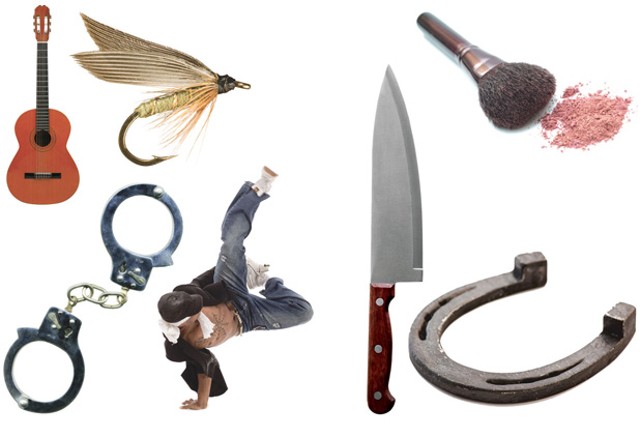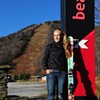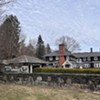Published August 18, 2010 at 10:38 a.m. | Updated September 16, 2016 at 3:20 p.m.
When Middlebury College professor Jason Mittell pitched a 200-level film and media culture course called “Urban American and Serial Television: Watching ‘The Wire’” to the school’s curriculum committee, none of its members questioned the class’ academic merits. Although the course wasn’t standard collegiate fare — it was designed around HBO’s critically acclaimed drama “The Wire” — the committee understood that the television series presents an accurate, if bleak, portrayal of a struggling American city.
The committee also recognized that the show provided a springboard for discussions of both contemporary urban American society and the aesthetic practices of modern television. Its sole concern was how much time students would need to spend watching the epic series.
While national news media made a big deal of the course when it was first offered in 2009, Mittell is hardly the first professor to use popular media or other subjects attractive to today’s college students to drive a course. Colleges increasingly welcome classes whose subject matter may seem more suited to the coffeehouse than the academy, and Bob Cluss, Middlebury’s dean of curriculum, welcomes the trend.
“More and more, there’s an appreciation that excellent content can be found in interesting places,” Cluss says. “There’s been a trend of moving away from the more traditional canon, if you will.”
What I’d like to know is, where the hell were these classes when I was suffering through Professor No-Sweat McNett’s interminable intro to anthropology course? While I did take a number of classes on interesting topics — such as white-collar crime; drugs and alcohol in contemporary culture; and sports in society — I never saw classes on gardening, the apocalypse or how to become a rock star in my college catalog.
Today’s college students have access to as many wacky courses as kicked kegs at a frat party. Despite the appearance of academic flimsiness, these offbeat courses are just as rigorous as their more conventional cousins, Cluss insists. He believes their interdisciplinary nature mirrors our interconnected and ever-shrinking world. Still, just try explaining to parents why they’re paying $50,000 a year for their kid to learn about comic books and circus freaks.
Here are some college classes currently offered in Vermont we wish we could take.
WCN 234 — 2001: Space Odyssey and the Philosophy of Everyday Life
It’s a safe bet that if you ’ve seen Stanley Kubrick and Arthur C. Clarke’s seminal film 2001: A Space Odyssey, you still don’t have a clue what it means. Unless you watched it while you were high, in which case you probably can’t remember your brilliant analysis of the movie anyway.
But if you take Didier Delmas’ class, you’ll be that much closer to deciphering the meaning of the film. According to the course description, the class “will explore 2001 as a battle between rationalism and relativism — or, more particularly, as the film suggests through its music and graphics, between the conflicting philosophies of René Descartes and Friedrich Nietzsche — that continually challenges viewers with the questions: Do we make nature or does nature make us?” Got that? If you don’t, fret not. Delmas also examines parodic takes on the movie, and students get to make their own 2001 spoofs.
CRJ 3140 — Mass Murderers and Serial Killers
Murder is always a hot topic on college campuses, though not always for good reasons. Remember the shootings in Virginia Tech and the University of Alabama in Huntsville? This course explores mass killings like those perpetrated by deeply disgruntled and disturbed people, but also the work of more premeditated murderers Son of Sam and the Green River Killer. You may not be able to sleep so well after Laurie Rosenzweig’s class, but at least you’ll learn how serial killers got that way.
EDG 310 — Interactive Storytelling
Contemporary video games are nothing without the story. That’s why you don’t see gamers today spending hours diddling with Pong or Pac-Man. Today’s video games have intricate plotlines and complicated character arcs. Donkey Kong they ain’t. Take the Xbox 360 game Tom Clancy’s Splinter Cell Conviction (yes, that Tom Clancy, of crime-thriller fame). The plot description on Wikipedia is longer than this article.
At Champlain, Erik Esckilsen, a journalism and creative writing instructor, will help students in the college’s Game Design program “transform stories in games from simplistic, clunky add-ons into mature, compelling art forms.” I guess that’s how you explain it to the parents — it’s art!
PHI 3000 — The Grateful Dead & Philosophy
You can’t be a hippie college in Vermont without offering a course on the sagacity of Jerry Garcia. The faculty at Green Mountain College (recently voted greenest college in the nation by Sierra magazine) understands this. Hence a course that teases out the philosophical themes that influenced the metamorphosis of Deadhead culture and seeks to grasp the nature of psychedelic experiences. According to the course description, students in Joe Markowski’s class will “further” their exploration of “the interfaces between philosophy and pop culture.” You don’t need to get what Jerry was talking about; you just need to be, man. And don’t worry: “No prerequisites required for this trip.”
BIO 1050 — Pretty or Nasty: The World of Cosmetics
What could be better than a college course that begins with a makeover? No, seriously. In Liz Dolci’s class, students will be treated to a makeup session offered by a “representative from a cosmetic company.” This is all in the pursuit of knowledge, mind you. In addition to the makeover, students will learn about the economics of the $18 billion global cosmetics industry. Also taught — safety, ethical and self-esteem issues relating to lipstick, blush and eyeliner. Male students looking for a hot date might do well to sign up for this coed hotbed. But be prepared to talk about your own cosmetic use.
MUS 3055 — Rock and Roll: Form and Style
So you want to be a rock star? Who doesn’t? Luckily, Lyndon State recognizes that most of us harbor this secret desire. In this class, taught by bona fide rock star Joe Gittleman, of Mighty Mighty Bosstones fame, and history professor Paul Searls, students will learn the finer points of stage diving, hair swinging and guitar riffing. Extra credit goes to those who collect hot groupies and bring them to class.
Students will also learn about the cultural roots of rock ’n’ roll and historical forces that helped shape the various styles of rock music. Tight pants and leather jackets are optional.
NSC 596 — Chemistry in the Kitchen
Everyone knows that if you’re not into the natural sciences, the study of chemistry can be as soporific as a bottle of Ambien. But not at Marlboro, where chemistry instruction takes a practical bent. In this class taught by Todd Smith, students learn more than how that three-week-old pizza slice at the back of the fridge came to support a small nation of mold. Topics include what acid is, how bacteria perform fermentation and how heat changes food. In addition to weekly lectures, the course features edible “experiments.” What college kid doesn’t love free food?
AMST 0283 — From George Washington to John Travolta: Social Dance in Popular Culture
Despite its catchy title, this class, taught by Andrew Wentink, is pretty standard academic fare. It’s less about “Stayin’ Alive” and more about staying awake. We kid. If you want to know how the Lindy Hop influenced postwar race relations, or how the Hustle contributed to sexual promiscuity in the 1970s, this is the course for you. Warning: real work ahead. The class “will involve the investigation of primary source materials including contemporary letters and diaries, dance manuals, newspaper and journal reports, and accounts of social dance in American literature.” If you’re lucky, you might learn how to Charleston.
CJ 424 — Murder: Our Killing Culture
While Castleton’s murder class is specifically about those who kill serially, Penny Shtull’s course at Norwich is just straight up about killing. Of all kinds. Intrafamilial homicide, murder in the workplace, gangland killings. You name it, she covers it. The class isn’t just a prurient examination of murder as entertainment; students taking this course will actually learn “characteristics, trends and the theoretical explanations of homicide.” Don’t worry — no actual killing techniques are taught. That’s a different Norwich class.
FS 114 — A River Runs Through It: The Literature and Craft of Fly-Fishing
“Dear Mom and Dad, College is great. I’m learning how to tie flies. Please send waders, a creel and the new Orvis catalog.” And thus begins the college career of a handful of lucky St. Mike’s freshmen — in a class about fly-fishing. Understandably, Bill Grover’s offering is a perennial favorite. Who wouldn’t want to learn ancient angling techniques while getting college credit? Lest parents think the class isn’t academic enough, the students will apparently “contemplate questions of philosophy, politics, class, gender, science, religion, life cycles and the serious pursuit of leisure.” Extra credit if anyone actually hooks anything.
AS 381 — Special Topics in Applied Science: Introduction to Farrier Science
If you’re a fan of all things equine and aren’t afraid of getting kicked, bitten or head butted by a 1-ton beast, then this class is for you. At Sterling College, all the classes are atypical, so this one on shoeing horses fits right in. Rick Thomas, a certified farrier, takes students through a semester of equine anatomy, physiology, biomechanics and nutrition so that, by the end, they’ll be shoeing horses like cowpokes. That is, if they don’t get stepped on.
NFS 033 — What’s Brewing in Food Science
What is every college student’s dream? Hint: It’s not ending up in a “Girls Gone Wild” video. Answer? A class completely devoted to beer. The ingredients of beer, the production of beer, the drinking of beer, etc. In Todd Pritchard’s freshman-level food-science class, students learn how beer is made and how the beverage should be consumed responsibly. They’re also taught how to play quarters, beer pong and flip cup. Students can expect to be tested on keg-stand technique.
Class Recall
Seven Days staffers have taken their share of ridiculous college courses. Here’s a smattering of some memorable classroom experiences:
Margot Harrison, associate editor
“Representations of Death in German Literature,” Harvard University
It was taught by a young female German professor on a fellowship who treated the whole subject (which was her next book) with unseemly glee. I quickly learned the real theme of the course was “German romantic writers were totally hot for dead chicks.”
Week after week, we watched Fräulein Bronfen’s eyes glitter as she dissected a famous poet’s necrophilia. While there were a lot of creepy poems written about pretty dead girls back then, many of the (many, many) assigned texts were only tangentially related to the theme. Still, recently, when skimming the Twilight books (which rhapsodize about the vampire hero’s “cold, marble” skin), I decided Bronfen was on to something after all. Millions of necrophiliac teenage girls can’t be wrong.
Ken Picard, staff writer
“Music and Mysticism,” University of Texas at Austin
This was a graduate-level course taught through the department of ethnomusicology, and was a global survey of various rites and rituals involving music, trance and altered states of consciousness, which frequently involve psychoactive drugs. We learned about everything from the whirling Dervishes of Sufism to voodoo drumming rituals to Grateful Dead shows. Got exposed to a lot of unusual tunes. Hallucinogens? Except for the independent-study variety, not so much.
Suzanne Podhaizer, food editor
“Sociology of Pleasure,” University of Vermont
We discussed Michael Jackson, watched the movie Freaks and theorized about sex. It was like late nights in the dorm, except with a professor there.
Carolyn Fox, calendar editor
“Human Sexuality,” Champlain College
I took it my last semester, and the first class started with a rousing game of sex-term charades. My friend Laura and I thought we had it hard when we had to enact “erectile dysfunction” in front of a classroom full of strangers, but it proved far easier than other partners’ picks, like “abortion” and “hermaphrodite.”
The class was a lively, open and effective approach to sexual education. Other memorable learning activities included writing dirty words for anatomy on the dry-erase boards to analyze their implications, and acting out arguments between couples to work on sexual communication.
Tyler Machado, deputy online editor
“Women and the Christian Tradition,” St. Michael’s College
This was the most awkward course I took. I’m a guy, and I was raised Catholic (although I haven’t been to church since confirmation), so this class was an exercise in self-loathing. To make matters worse, I was the only male in the class. The fact that I’m totally for gender equality and against cultural patriarchy didn’t make that fact any less awkward. But at least I know now what it’s like to be on the wrong end of tokenism.
Andy Bromage, staff writer
“Native American Beadwork,” Colorado College
Freshman year I took a class called “Native American Beadwork,” where — you guessed it — we learned how to make traditional Indian bead designs. We mastered the art of peyote stitch, the tubelike beads that Native Americans wrap around sticks, and nappy hippies wrap decoratively around their dreads.
As if sitting in a studio-art room beading for three hours at a clip wasn’t chill enough, the class went on an overnight beading retreat to the Cabin — literally, a log cabin the college owned in the foothills of Pikes Peak. There, my classmates and I happily beaded the day away. The mosaiclike designs — made of tiny glass seed beads that we sewed with needle and thread — were actually quite beautiful. But I had trouble explaining to my incredulous father why his hard-earned money was paying for me to take an “arts and crafts” class.
Celia Hazard, designer
“Geek Graffiti,” Parsons The New School for Design
The main idea of the course was to somehow document the strange and everyday events that took place on the New York City streets, and then make that into some sort of web-based platform. Our homework every week was to snap pics of graffiti, so I often found myself in places that maybe I shouldn’t have been, with a camera for self-defense. We got an automatic A for getting arrested. I got the closest in the class by taking pics of stuff under the freeway. I think the cops thought I was taggin’ shit! I got a B+ for those photos.
Eva Sollberger, multimedia producer
Independent study/gym class, Bard College at Simon’s Rock
My favorite course in college was an independent study/gym class in which I wrote lame journal entries about all the physical activity I was getting while doing nary a thing. There was something entertaining about describing walks through the woods that I never actually took. I feel sorry for the fool who had to read all that ridiculous rambling.
Dan Bolles, music editor
Bowling, University of Vermont
My experience at UVM was checkered, at best. But during my groovy-UV cameo, the class I always wanted to take was bowling. Come to think of it, that may explain the brevity of my collegiate career.
Megan James, arts writer
“Anatomy and Kinesiology,” Middlebury College
One of my wackiest classes was “Anatomy and Kinesiology” — in the dance department — which I took for the science distribution requirement after flunking Rocks for Jocks. Every day we’d pair up and touch each other, one partner lying down while the other pulled on her neck, or bent her knees open and closed. One time we sat in a circle all together and learned how to breathe through our many sphincters.
Lauren Ober, staff writer
“Strategies in Stress Reduction,” American University
One of the more absurd classes I took taught us how to cope with and prevent stress in our lives. As a college junior with no real responsibilities, I didn’t know from stress. But it seemed like an easy A, and Lord knows I needed one of those. We mostly sat in the dark with our shoes off and talked about meditation. Sometimes we tried to meditate. Once a Buddhist monk visited the class and told us that our brains functioned the same way in meditation as they did during orgasm. I had a whole new level of appreciation for meditation after that.
More By This Author
Speaking of...
-

Middlebury: What to See, Do and Eat During the Eclipse
Mar 6, 2024 -

In Terms of Registering to Vote, Midd Kids Are Top of the Classes
Feb 28, 2024 -

Records Show UVM Professors Questioned Decision to Nix Palestinian Writer’s Appearance
Dec 20, 2023 -

UVM Strikes Deal With Burlington That Could House More Students on Campus
Dec 18, 2023 -

Saint Michael's College Names New President
Oct 30, 2023 - More »
Comments
Comments are closed.
From 2014-2020, Seven Days allowed readers to comment on all stories posted on our website. While we've appreciated the suggestions and insights, right now Seven Days is prioritizing our core mission — producing high-quality, responsible local journalism — over moderating online debates between readers.
To criticize, correct or praise our reporting, please send us a letter to the editor or send us a tip. We’ll check it out and report the results.
Online comments may return when we have better tech tools for managing them. Thanks for reading.














































